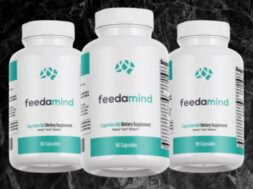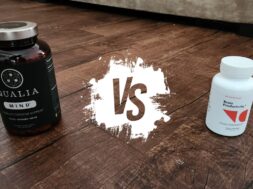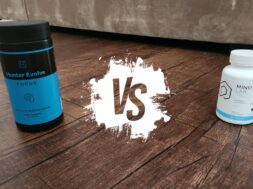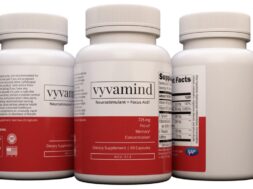
I love this area of brain optimization through supplementation. However, it invites players of varying quality to the market to take advantage of the booming trend. Feedamind is one of the new players with their domain registered in 2023.
Which camp do they fall in? The premium, efficacious nootropic or the less effective nootropic with underdosed and speculative ingredients?
Pros
- Natural Ingredients: Feedamind has all-natural ingredients, including various vitamins, herbs, and minerals.
- Enhanced Cognitive Function: It aims to improve focus, memory, concentration, and overall brain health.
- FDA-Regulated Manufacturing: The supplement is manufactured in FDA-regulated facilities in the USA, ensuring high quality and safety standards.
- Comprehensive Formula: It contains several well-researched and speculative compounds, such as chocamine, bacopa monnieri, alpha-GPC, L-theanine, and resveratrol.
Cons
- Relatively New Product: As a new product in the market, long-term effectiveness and results are not extensively documented.
- Cost: Some may find the supplement relatively expensive compared to other nootropics.
- Limited Availability: Only available for purchase through their official website, which might limit accessibility.
- Slow Shipping: Some users have reported slow shipping times.
- Individual Results May Vary: As with any supplement, individual results can vary and might not work equally well for everyone.
Quick Verdict
Feedamind claims to enhance cognitive function but the chronic underdosing and speculative ingredients left me underwhelmed.
Our #1 nootropic of choice is Mind Lab Pro. It’s formulated with an effective stack of nootropic ingredients without any stimulants so you can take it any time of day to improve cognitive function in the short and long term.
Who Is Feedamind?
Feedamind is a nootropic supplement that has gained attention for its potential to enhance cognitive function, focusing on improving memory, concentration, and overall brain health. The product is brought to market by Karobra Ltd, a relatively new company based in Ireland.
The supplement is manufactured in FDA-regulated facilities in the United States despite the company being based in Ireland.
Feedamind Ingredients
Chocamine® 500 mg
Chocamine is a patent cocoa-based ingredient that gives the purported benefit of chocolate without the added sugar and fat. The main active ingredient is theobromine, which may provide cognitive benefits.
Researchers have looked into theobromine, a chemical found in cocoa, to see if it might help brain health.
Studies suggest that while theobromine may exhibit a comparatively delayed nootropic effect than coffee, it could potentially offer long-term neuroprotective advantages, potentially reducing pathology associated with Alzheimer’s disease [18].
More research is needed to thoroughly understand the effects on cognition.
Theobromine appears to have a different effect on mood and vigilance than coffee, with some research suggesting that it may not substantially impact these qualities in nutritionally relevant doses [19].
However, mixing theobromine with coffee may alter its effects, potentially providing cognitive and mood benefits without significantly boosting blood pressure [20].
Additional research is required to prove theobromine’s cognitive and mood-altering effects.
Bacopa Monnieri 250 mg
Experimental data suggests that Bacopa Monnieri, an Ayurvedic herb associated with aging, may improve cognitive function and memory [1]. According to research, Bacopa may help with verbal learning, memory development, and delayed recall [2].
It also appears to improve cognitive functions, including attention and processing speed [3]. However, the evidence for its impact on cognitive function in healthy young people is inconclusive [4].
The recommended daily doses vary from 300 to 450 mg. While generally well tolerated, it can cause stomach troubles in certain people.
More research is required to fully understand its impact on various cognitive capacities and the optimal dosages.
Feedamind contains 250 mg of Bacopa Monnieri, which is slightly below the recommended dosage range.
L-Tyrosine Powder 250 mg
L-tyrosine is a key component linked to improved cognitive performance. This amino acid has been demonstrated to increase cognitive flexibility, reducing the effort required to switch tasks [5].
L-tyrosine is particularly effective during periods of high cognitive demand or difficult conditions, improving cognitive performance under stress [6].
However, research dosages begin at a minimum of 2 g to detect cognitive improvements. Feedamind only includes 250 mg, which is likely insufficient to produce an effect.
Alpha-GPC 100 mg
Alpha GPC, a choline-containing phospholipid, enhances cognitive performance in neurological disorders such as dementia [7].
According to research, it improves memory and attention and may benefit brain health. Studies demonstrate that it can enhance cognitive performance, particularly with other therapies such as donepezil [8].
It is generally well-accepted and safe. Alpha GPC boosts acetylcholine levels in the brain, which are necessary for memory and learning [9].
It is used as both a medication and a dietary supplement. According to studies, Alpha GPC improves cognitive performance, notably in adult-onset dementia disorders [10].
L-Theanine 50 mg
L-Theanine has a reputation for improving mental health, with research showing it can combat stress and anxiety with daily doses of 200-400 mg [11][12].
L-Theanine’s ability to promote relaxation without sedation makes it essential for cognitive support, especially when stressed. When combined with coffee, a synergistic effect results in one of the original nootropic recipes.
While Feedamind only contains 50 mg of L-theanine, it is sufficient to produce a nootropic effect with caffeine. It takes the edge off caffeine, lowering jitters and anxiety.
Oat Straw Extract 10:1 20 mg
Another ingredient that has caught people’s attention is oat straw, which is thought to provide cognitive benefits. A study found that taking 800 milligrams of oat straw extract improved performance on memory recall, speed, and executive function tests [13].
Although these results show promise, it should be noted further research is necessary to validate the consistent cognitive benefits associated with oat straw.
Cat’s Claw 4:1 Extract 20 mg
Even though Cat’s Claw is a common ingredient in nootropic blends, there is no evidence it actually works in this function. Its inclusion is predicated on unproven theoretical advantages and long-standing traditional uses.
Pterostilbene 46.67 mg
Pterostilbene may counteract cognitive deterioration associated with aging [14]. Furthermore, it may have more potent effects than resveratrol [15].
Dynamine 50 mg
Dynamine is an alkaloid similar to theacrine, and it is thought the combination with caffeine leads to faster absorption and longer-lasting energy without the crash. Research has shown it may improve memory and reaction time in esports gamers [21].
This was with a 75 mg dose alongside caffeine, so a 50 mg dose without caffeine has not been studied, so the effects are unknown.
Resveratrol 98% 14.3 mg
Resveratrol may have neuroprotective properties against age-related diseases such as Alzheimer’s disease and vascular dementia [15].
Marigold Flower Extract (5% Lutein) 6 mg
Lutein and zeaxanthin, carotenoids present in the eye, have been associated with enhanced visual performance in patients with age-related macular degeneration [16].
Supplementation with these nutrients has been found to improve visual acuity contrast sensitivity and reduce glare recovery time.
Furthermore, lutein alone can improve macular pigment optical density and visual acuity [17].
These findings show that lutein can benefit eye health, particularly in age-related macular degeneration, although more research is needed to confirm this.
Feedamind Price
Feedamind is a slightly more expensive nootropic per serving compared to other brands. It’s likely because Feedamind is loaded with many ingredients to potentially give you a cognitive boost.
Here’s the price breakdown based on the bundle and per serving.
| Feedamind | Price | Price per Serving |
|---|---|---|
| 1 Bottle (30 servings) | $72.99 | $2.43 per serving |
| 2 Bottles (60 servings) | $135.99 | $2.26 per serving |
| 3 Bottles (90 servings) | $199.99 | $2.22 per serving |
Feedamind Benefits
Enhance Alertness & Focus
Feedamind uses chocamine, which is a patented ingredient from chocolate. The main active ingredient, theobromine, is thought to enhance cognition differently from coffee, but the research isn’t strong on this.
However, there seems to be a synergistic effect when taken with coffee, so Feedamind could be part of your morning coffee routine.
Further, if you do take this with caffeine, the L-theanine will reduce symptoms of jitters and anxiety due to the synergistic nootropic effect.
Stimulant Free Formulation
Feedamind is a stimulant free formulation so there is no caffeine or other heart racing substances.
Instead, they’ve used ingredients that may enhance cognition, reaction time, and mental performance similar to caffeine, like Dynamine and Oat Straw extract.
These are more speculative ingredients than Bacopa Monneiri or Alpha GPC. However, the lack of stimulants means you can take Feedamind at any time without disturbing your sleep.
Who Is Feedamind For?
Late Afternoon Or Evening Workers
The afternoon slump is real. Especially if you rely on caffeine in the morning to get your day going. But the last thing you want is to be chugging coffee and energy drinks to get through your work afternoon.
It becomes a vicious cycle, negatively affecting your sleep and mood as the day progresses. If you have a long afternoon or late evening deadline, taking Feedamind can provide the mental and focus boost without the negative caffeine effects when taken late in the day.
Biohackers & Health Optimizers
Biohackers and health optimizers understand how their bodies react to new supplements and foods they try.
They are best for testing nootropics like Feedamind, which contains many speculative supplements with some ingredients being slightly underdosed.
Individuals Prone To Stress & Anxiety
Ingredients like Bacopa Monneiri and L-theanine are powerful nootropics that have a calming effect, reducing stress and anxiety.
If I take Feedamind with an energy drink, I find it reduces the jitters and caffeine anxiety that I experience with the energy drink alone.
My Experience With Feedamind
I’ve used Feedamind a few times before mentally demanding tasks like writing this review, podcasting, and even coaching.
As mentioned, Feedamind can take the edge off caffeinated drinks if you find they cause jitters and anxiety from the caffeine.
I’ve found Feedamind doesn’t “dial you in” like other effective nootropics that provide an instant brain boost, like NooCube, Mind Lab Pro, and Nooceptin.
Maybe it’s the underdosed ingredients or using more speculative ingredients than proven ones.
Regardless, I don’t feel an instant mental performance boost as advertised. But your experiences may differ.
Also, it’s not designed for long-term brain change, so it’s not something you must take daily like the Braini nootropic, which is for long-term use.
User Reviews & Testimonials
From the few reviews and testimonials I found online, it seems mainly negative. However, there are a couple of positive reviews.
“I have been using this product for about two months now, and I have definitely noticed a difference in my concentration and memory. I actually ran out and had a few days lapse between, and I won’t do that again! It makes a difference!” – Alan and Kim.
“I am testing Feedamind out for my ADHD clients to supplement be an alternative to or replace medications specific to ADD/ADHD. I do not have such a disorder but in testing noted a bump in energy and focused attention 45 min after taking. I feel like my attention was put into turbo drive for the first hour, then wanes over the next 4.” – Herb Cohen.
The negative reviews center around not feeling any differences when taking Feedamind.
“Did not do anything for me. No energy. Nothing changed.” – Anonymous
“Maybe [worked], slight improvement” – Marshall Wiener
As with all supplements, you’ll have people on both sides, so individual experiences may vary.
Feedamind Side Effects
There are no reported side effects from the ingredients in Feedamind, and I felt no adverse side effects when taking it.
Individual experiences with nootropics can vary widely, and what works well for one person may not for another.
Additionally, it’s always advisable to consult with a healthcare provider before starting any new supplement regimen, especially for those with existing health conditions or who are taking other medications.
Feedamind Alternatives
If you’ve gotten this far and are not sold on Feedamind, here are some alternatives.
Vyvamind
Vyvamind’s formulation, which contains less L-tyrosine and citicoline than previous research suggests, is intended to supplement the principal nootropic combination of caffeine and L-theanine.
This combination is well known for improving concentration and cognitive function. The supplement is touted as a non-stimulant alternative for clients who choose a more natural and less intensive approach to cognitive growth.
Vyvamind is great for coffee-averse people, busy professionals who need a focus boost, and students during study sessions.
Our Vyvamind review provides a complete breakdown.
Mind Lab Pro
Mind Lab Pro is a well-known nootropic that has received attention due to its potential cognitive advantages. Its formulation, which is intended to improve concentration and mental clarity, is free of stimulants and composed of natural ingredients, making it an excellent option for those seeking a health-conscious regimen.
The product’s unique blend of 11 research-backed components distinguishes it from other brain health supplements on the market.
These substances were carefully chosen to enhance various cognitive processes, including memory, focus, mental clarity, mood, and processing speed.
Despite some concerns about the quantity of specific substances and the need for additional scientific evidence, Mind Lab Pro is widely acclaimed for its ability to improve cognitive performance, notably for professionals, students, the elderly, and sports.
Our Mind Lab Pro review contains a comprehensive breakdown.
NooCube
These are well known for their mental health advantages. Several compounds, including Huperzine-A, are deemed speculative without more investigation.
NooCube is intended to improve cognition and alertness without the use of stimulants, and the proportions of each ingredient are explicitly disclosed.
NooCube is especially useful for working professionals, students, the elderly, gamers, and combat athletes since it provides numerous cognitive benefits without the jittery negative effects associated with caffeine.
Our NooCube review contains a full analysis.
Frequently Asked Feedamind Questions
Is Feedamind Legit?
Feedamind is a legit nootropic supplement. Whether you see benefits when using it will vary based on the individual.
Is Feedamind Safe?
Feedamind is safe, and the ingredients have no reported major side effects. The gelatin capsule may contain traces of gluten, so if you’re celiac, you may opt for a nootropic that’s not in a capsule like Mind Vitality.
Summary
I didn’t find significant benefits from taking Feedamind. I believe it’s because the underdosed and speculative ingredients make up most of the formulation. However, your mileage may vary as positive testimonials show its effectiveness.
Instead, try Mind Lab Pro. It’s a proven effective formula with third party testing for purity.
Mind Lab Pro
Mind Lab Pro Nootropic Brain Supplement
Non-Stimulant Nootropic For Instant Brain Boost
Boost brain power & reduce cognitive decline with this powerful nootropic.
CHECK CURRENT DEALSReferences
- Calabrese, C., Gregory, W. L., Leo, M., Kraemer, D., Bone, K., & Oken, B. (2008). Effects of a standardized Bacopa monnieri extract on cognitive performance, anxiety, and depression in the elderly: a randomized, double-blind, placebo-controlled trial. The journal of alternative and complementary medicine, 14(6), 707-713.
- Morgan, A., & Stevens, J. (2010). Does Bacopa monnieri improve memory performance in older persons? Results of a randomized, placebo-controlled, double-blind trial. The journal of alternative and complementary medicine, 16(7), 753-759.
- Kongkeaw, C., Dilokthornsakul, P., Thanarangsarit, P., Limpeanchob, N., & Scholfield, C. N. (2014). Meta-analysis of randomized controlled trials on cognitive effects of Bacopa monnieri extract. Journal of ethnopharmacology, 151(1), 528-535.
- Pase, M. P., Kean, J., Sarris, J., Neale, C., Scholey, A. B., & Stough, C. (2012). The cognitive-enhancing effects of Bacopa monnieri: a systematic review of randomized, controlled human clinical trials. The Journal of Alternative and Complementary Medicine, 18(7), 647-652.
- Steenbergen, L., Sellaro, R., Hommel, B., & Colzato, L. S. (2015). Tyrosine promotes cognitive flexibility: evidence from proactive vs. reactive control during task switching performance. Neuropsychologia, 69, 50-55.
- Jongkees, B. J., Hommel, B., Kühn, S., & Colzato, L. S. (2015). Effect of tyrosine supplementation on clinical and healthy populations under stress or cognitive demands—A review. Journal of psychiatric research, 70, 50-57.
- Traini, E., Bramanti, V., & Amenta, F. (2013). Choline alphoscerate (alpha-glyceryl-phosphoryl-choline) an old choline-containing phospholipid with a still interesting profile as cognition enhancing agent. Current Alzheimer Research, 10(10), 1070-1079.
- Sagaro, G. G., Traini, E., & Amenta, F. (2023). Activity of Choline Alphoscerate on Adult-Onset Cognitive Dysfunctions: A Systematic Review and Meta-Analysis. Journal of Alzheimer’s Disease, (Preprint), 1-12.
- Kansakar, U., Trimarco, V., Mone, P., Varzideh, F., Lombardi, A., & Santulli, G. (2023). Choline supplements: An update. Frontiers in Endocrinology, 14, 1148166.
- Moreno, M. D. J. M. (2003). Cognitive improvement in mild to moderate Alzheimer’s dementia after treatment with the acetylcholine precursor choline alfoscerate: a multicenter, double-blind, randomized, placebo-controlled trial. Clinical therapeutics, 25(1), 178-193.
- Hidese, S., Ogawa, S., Ota, M., Ishida, I., Yasukawa, Z., Ozeki, M., & Kunugi, H. (2019). Effects of L-theanine administration on stress-related symptoms and cognitive functions in healthy adults: a randomized controlled trial. Nutrients, 11(10), 2362.
- Williams, J. L., Everett, J. M., D’Cunha, N. M., Sergi, D., Georgousopoulou, E. N., Keegan, R. J., … & Naumovski, N. (2020). The effects of green tea amino acid L-theanine consumption on the ability to manage stress and anxiety levels: A systematic review. Plant foods for human nutrition, 75, 12-23.
- Kennedy, D. O., Jackson, P. A., Forster, J., Khan, J., Grothe, T., Perrinjaquet-Moccetti, T., & Haskell-Ramsay, C. F. (2017). Acute effects of a wild green-oat (Avena sativa) extract on cognitive function in middle-aged adults: A double-blind, placebo-controlled, within-subjects trial. Nutritional neuroscience, 20(2), 135-151.
- Dutta, B. J., Rakshe, P. S., Maurya, N., Chib, S., & Singh, S. (2023). Unlocking the therapeutic potential of natural stilbene: Exploring pterostilbene as a powerful ally against aging and cognitive decline. Ageing Research Reviews, 92, 102125.
- Lange, K. W., & Li, S. (2018). Resveratrol, pterostilbene, and dementia. BioFactors, 44(1), 83-90.
- Wang, X., Jiang, C., Zhang, Y., Gong, Y., Chen, X., & Zhang, M. (2014). Role of lutein supplementation in the management of age-related macular degeneration: meta-analysis of randomized controlled trials. Ophthalmic research, 52(4), 198-205.
- Giannaccare, G., Pellegrini, M., Senni, C., Bernabei, F., Scorcia, V., & Cicero, A. F. G. (2020). Clinical applications of astaxanthin in the treatment of ocular diseases: Emerging insights. Marine drugs, 18(5), 239.
- Cova, I., Leta, V., Mariani, C., Pantoni, L., & Pomati, S. (2019). Exploring cocoa properties: is theobromine a cognitive modulator?. Psychopharmacology, 236, 561-572.
- Judelson, D. A., Preston, A. G., Miller, D. L., Muñoz, C. X., Kellogg, M. D., & Lieberman, H. R. (2013). Effects of theobromine and caffeine on mood and vigilance. Journal of clinical psychopharmacology, 33(4), 499-506.
- Mitchell, E. S., Slettenaar, M., Vd Meer, N., Transler, C., Jans, L., Quadt, F., & Berry, M. (2011). Differential contributions of theobromine and caffeine on mood, psychomotor performance and blood pressure. Physiology & behavior, 104(5), 816-822.
- Tartar, J. L., Banks, J. B., Marang, M., Pizzo, F., & Antonio, J. (2021). A combination of caffeine, TeaCrine®(theacrine), and Dynamine®(methylliberine) increases cognitive performance and reaction time without interfering with mood in adult male egamers. Cureus, 13(12).















